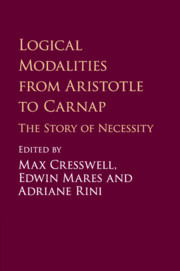Book contents
- Frontmatter
- Contents
- List of Figures and Tables
- List of Contributors
- List of Abbreviations
- Introduction
- 1 Aristotle on the Necessity of the Consequence
- 2 Aristotle on One- Sided Possibility
- 3 Why Does Aristotle Need a Modal Syllogistic?
- 4 Necessity, Possibility, and Determinism in Stoic Thought
- 5 Necessity in Avicenna and the Arabic Tradition
- 6 Modality without the Prior Analytics: Early Twelfth Century Accounts of Modal Propositions
- 7 Ockham and the Foundations of Modality in the Fourteenth Century
- 8 Theological and Scientific Applications of the Notion of Necessity in the Mediaeval and Early Modern Periods
- 9 Locke and the Problem of Necessity in Early Modern Philosophy
- 10 Leibniz's Theories of Necessity
- 11 Leibniz and the Lucky Proof
- 12 Divine Necessity and Kant's Modal Categories
- 13 Charles Sanders Peirce on Necessity
- 14 The Development of C. I. Lewis's Philosophy of Modal Logic
- 15 Carnap's Modal Predicate Logic
- Bibliography
- Index
9 - Locke and the Problem of Necessity in Early Modern Philosophy
Published online by Cambridge University Press: 05 September 2016
- Frontmatter
- Contents
- List of Figures and Tables
- List of Contributors
- List of Abbreviations
- Introduction
- 1 Aristotle on the Necessity of the Consequence
- 2 Aristotle on One- Sided Possibility
- 3 Why Does Aristotle Need a Modal Syllogistic?
- 4 Necessity, Possibility, and Determinism in Stoic Thought
- 5 Necessity in Avicenna and the Arabic Tradition
- 6 Modality without the Prior Analytics: Early Twelfth Century Accounts of Modal Propositions
- 7 Ockham and the Foundations of Modality in the Fourteenth Century
- 8 Theological and Scientific Applications of the Notion of Necessity in the Mediaeval and Early Modern Periods
- 9 Locke and the Problem of Necessity in Early Modern Philosophy
- 10 Leibniz's Theories of Necessity
- 11 Leibniz and the Lucky Proof
- 12 Divine Necessity and Kant's Modal Categories
- 13 Charles Sanders Peirce on Necessity
- 14 The Development of C. I. Lewis's Philosophy of Modal Logic
- 15 Carnap's Modal Predicate Logic
- Bibliography
- Index
Summary
In the early modern period necessity was tied to each of a clutch of interlocking notions: causation, laws of nature, essence, demonstration, logical inference, mathematical proof, etc. So, for example, some argued that if existence is of the essence of God, then God exists necessarily. Again, some argued that if the laws of motion are not known a priori but are discovered by experience, then they are not necessary. There was, however, no attempt to develop a typology of necessities, such as our contemporary distinctions among logical necessity, epistemic necessity, metaphysical necessity and nomic necessity. Indeed, a central concern of current-day interpreters of early modern texts is to disentangle claims about necessity in one domain, say, causation, from those in another, say, logic. Nor was the problem of necessity a desideratum for early modern philosophers to solve. There is a sense then in which it is slightly anachronistic even to speak of the problem of necessity in early modern philosophy.
Nevertheless, the modal notion of necessity features prominently in early modern philosophy and it is important that we as modern-day interpreters of early modern texts find ways to understand and explain how it was understood. To that end, it will be helpful to find a general way of framing the problem of necessity in early modern philosophy. What I offer here is a two-stage analysis that aims to capture the broad contours of a cluster of problems that we would now call problems of necessity. As such, it provides a reference point against which different philosophers’ accounts of modal notions can be compared and assessed. The chapter has two sections. Section 1 presents a general heuristic for studying the problem of necessity in the early modern period, including a crucial development in the early modern view of necessary facts about the world. Section 2 applies that heuristic, by way of example, to the philosophy of John Locke.
The General Problem of Necessity in Early Modern Philosophy
Most early modern philosophers admit that some propositions are true irrespective of the way the world is and would be true even if there were no world.
- Type
- Chapter
- Information
- Logical Modalities from Aristotle to CarnapThe Story of Necessity, pp. 174 - 193Publisher: Cambridge University PressPrint publication year: 2016

